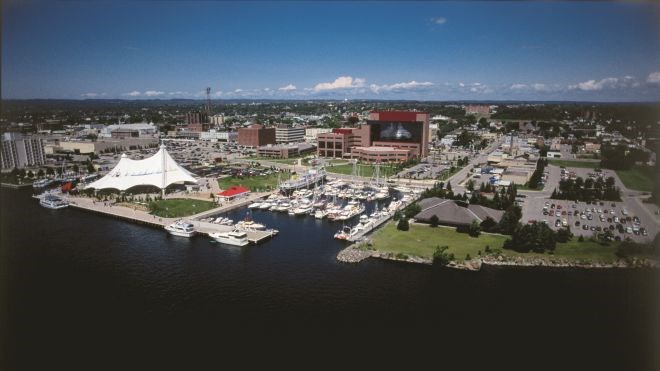“You can’t catch a fish if you don’t go fishing.”
That’s the approach Coun. Matthew Shoemaker took when proposing Sault Ste. Marie bid to become the next North American headquarters for online retail giant Amazon.
When the tech company issued a request for proposals (RFP) for a second headquarters in September, the rookie councillor initially only took a passing glance at what he saw as requirements for any potential contender city. But then he gave it a second look.
“I realized they were things that Amazon would like to have, but it didn’t say anywhere that not having some of those things would be a disqualifier,” he said.
In particular, Amazon cites a location within 30 miles of the population centre and 45 minutes of an international airport. It wants a site that’s close to major roadways, with access to mass transit, including rail, subway, or bus routes.
Initially, the company is seeking 500,000 square feet of building space, but that could grow up to eight million square feet beyond 2027.
It anticipates making investments of $38 billion into the community and estimates more than 50,000 jobs could be created as a result.
It seems like a giant leap for Sault Ste. Marie, Ont., population 73,000. Amazon’s current headquarters is located in Seattle, Wash., a city with a population of 700,000, and larger metropolitan centres like Dallas, Texas, and Chicago, Ill., are among the rumoured contenders for the new site.
But Shoemaker argues that what the Sault lacks in volume, it more than makes up for in character, logistics, and quality of living.
It has access to transportation corridors via rail, road, air and sea, and city staff has already pinpointed four properties in the city that fit Amazon’s size requirements.
It has two post-secondary educational institutions, in Algoma University and Sault College, as well as Lake State University across the bridge in Sault Ste. Marie, Mich., and the city is already seeing a burgeoning tech industry starting to build.
It’s heavily invested in alternative energy, with hydroelectric, wind, and solar power projects all in the area. Add to that natural attributes like clean air, nearby lakes and forests, and the Sault offers a high quality of life.
Perhaps one of its biggest virtues is its proximity to Sault Ste. Marie, Mich., and the Canadian Sault is using that to its advantage. The twin cities have decided to partner on the Amazon proposal, which Shoemaker believes gives them a unique edge over competitors.
“Toronto is probably more of what people think Amazon is looking for, but I think Amazon would have a hard time setting up in a place with no U.S. presence given the big climate down in the U.S. right now for seemingly some protectionist sentiment,” Shoemaker said.
“So I think teaming up with a U.S. city, offering that ability to have both a Canadian and a U.S. presence, sets us apart.”
On Sept. 25, Sault council unanimously voted to go forward with the proposal and staff swung into action. Shoemaker said the Sault’s Economic Development Corp. already had much of the data required, and it was just a matter of packaging it into something that would help the Sault stand out.
There was no shortage of ideas from the community, including one person who suggested sending their package in an Amazon box.
“We’re not going to be sending a giant cactus like some place in Arizona did,” Shoemaker chuckled. “But we do want to catch their attention.”
And, whether or not the bid is successful, that’s really what the exercise is all about, he said: getting Amazon’s attention and increasing awareness about Sault Ste. Marie and what it has to offer.
“We'll have this big document that will showcase all the strengths of our city, so we will be able to use it to market our city to other businesses, whether that's Amazon, whether that's smaller tech startups, whether that's someone in manufacturing, whether it's someone in forestry, or mining,” Shoemaker said.
“We'll have it and we'll be able to sell the Sault as a great place to do business, regardless of the industry.”




